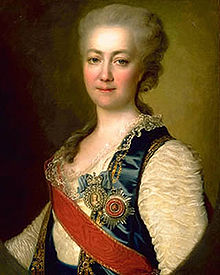
Peter the Great, Russia’s grand modernizer, flung open the legendary window to the West by introducing technological innovations and updated social decorum into his dominion. After his death in 1725, Russian intellectuals became acutely interested in the phenomenon of European Enlightenment, which emphasized the importance of the empirical knowledge and the use of reason. In Imperial Russia, like elsewhere on the European continent, the movement had its own dynamics, idiosyncrasies, and pivotal characters whose activities gave it a distinct shape and flavor.
The name of Ekaterina Romanovna Daskova (1743- 1810) looms large on the panorama of the eighteenth-century Russian Enlightenment. A woman of letters, a writer, and a publisher, Dashkova became one of the first females in Europe to hold an official post in a government controlled institution, when in 1783 she was appointed the director of the Imperial Academy of Sciences.¹ Later in the same year the princess founded and headed the Russian Academy of Languages.
At home Dashkova became famous for writing music, plays, articles, and editing scholarly journals, like The Companion of Lovers of the Russian Word. She travelled extensively and corresponded widely with the great thinkers of her age. see list
Intelligent and daringly outspoken Dashkova was an unofficial representative of Russia abroad and used her sharp mind and erudition to improve the image of her country. She was made a member of such internationally renowned establishments as the Royal Irish, Berlin, and Stockholm academies. In addition, in 1789 the Russian princess became first woman to be a member of the American Philosophical Society. Dashkova used Enlightenment-generated ideas about education and natural sciences to change the face of the Russian nation that was still considered to be barbarous and rude in the eyes of its western neighbors.
emerges from her captivity,
states her abilities and demands participation in government affairs,
in science,
in the transformation of Russia.”
Russian writer and freethinker Alexander Herzen (1812-1870)
¹ A. Woronzoff-Dashkoff. “Dashkova: First Woman Member of the American Philosophical Society,” 406.
Early Life
Involvement in Politics
Trips Abroad
How did Catherine the Great become the Empress of Russia?
Dashkova Wordle